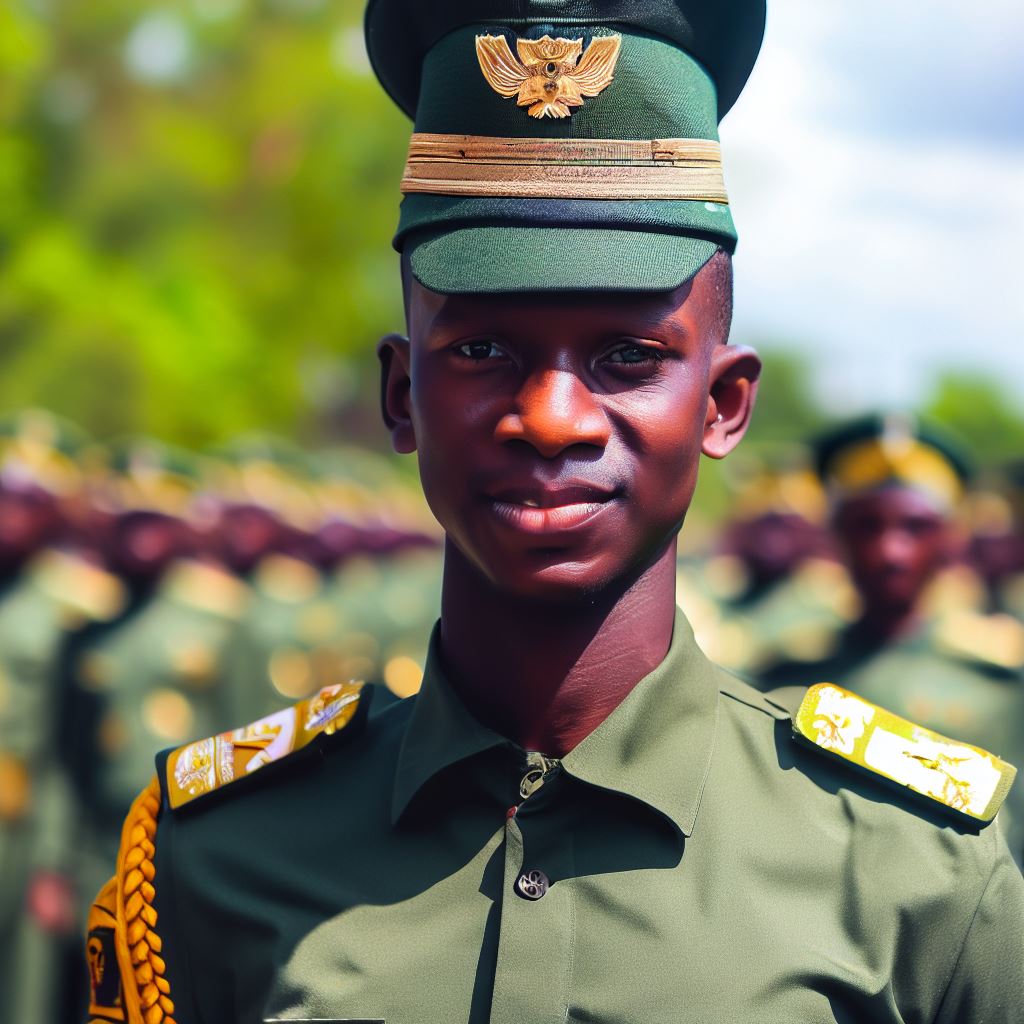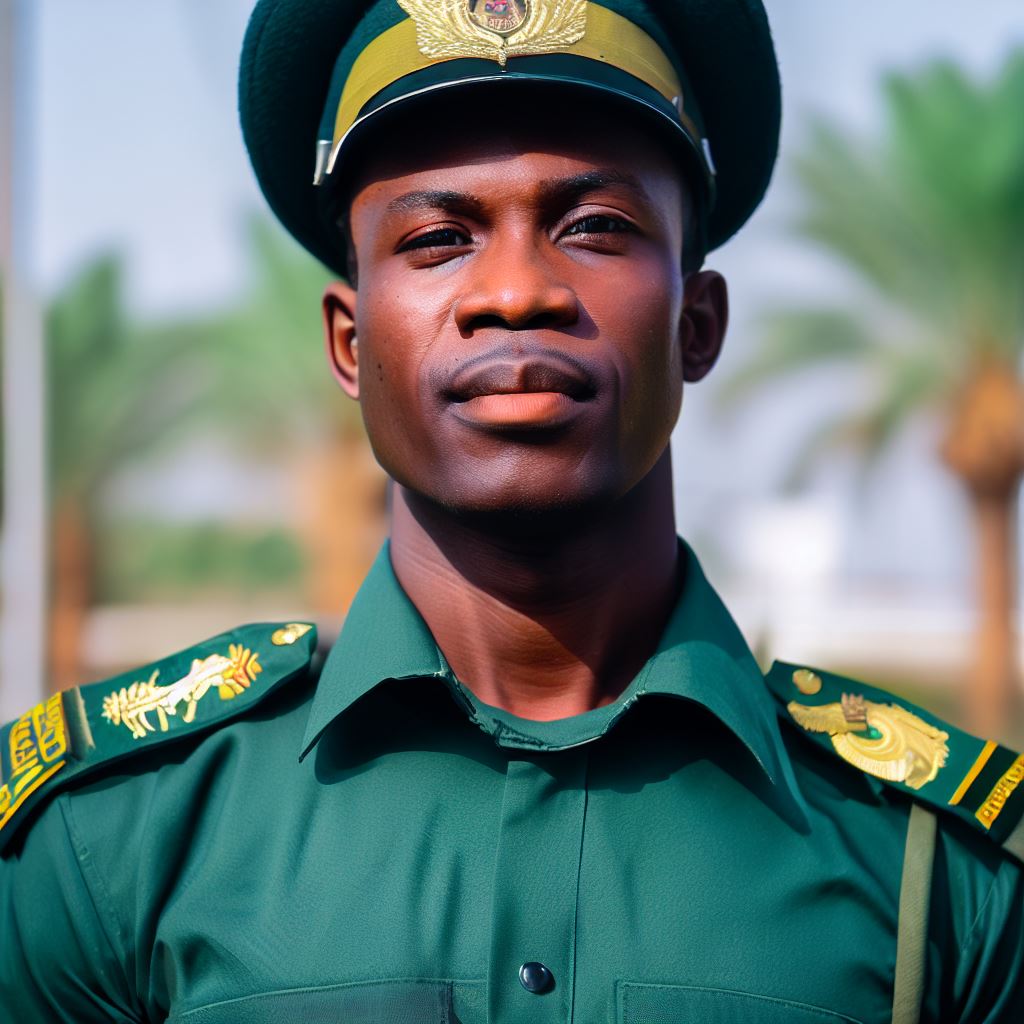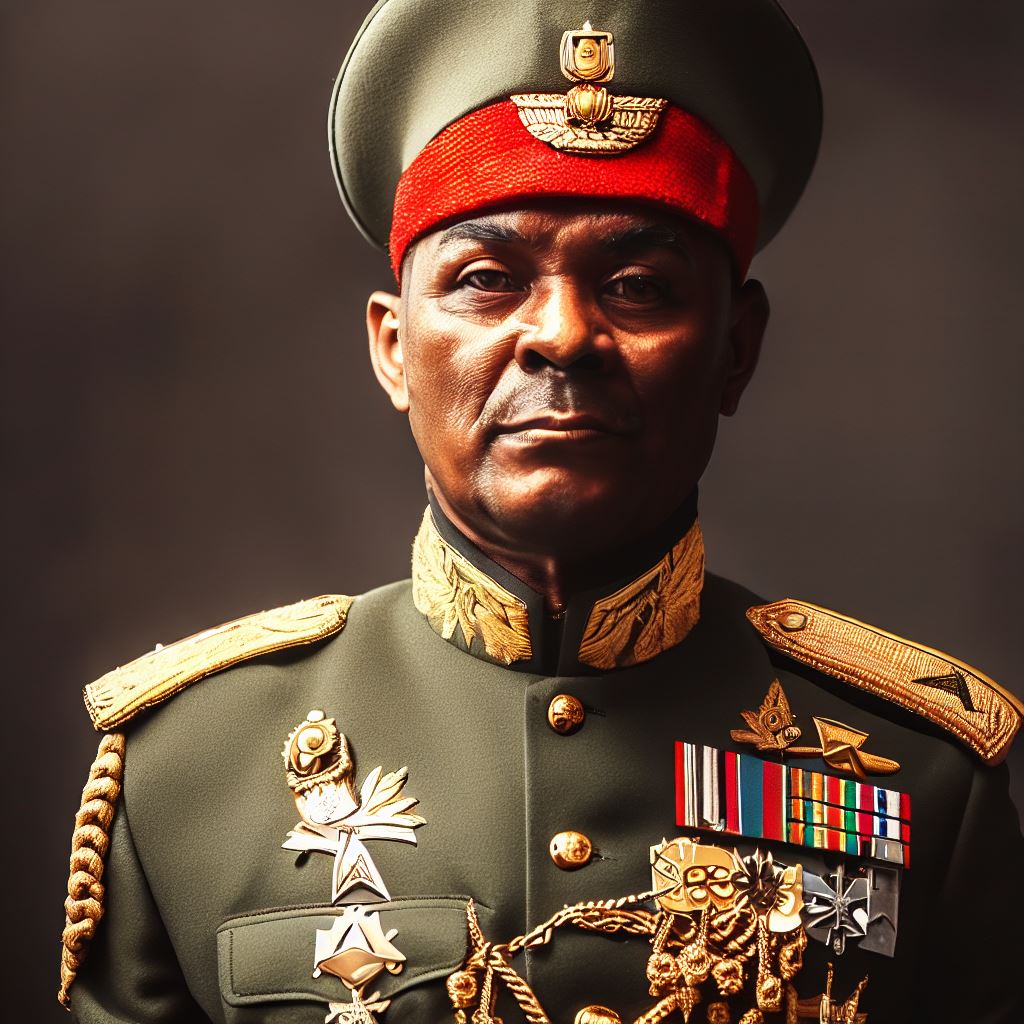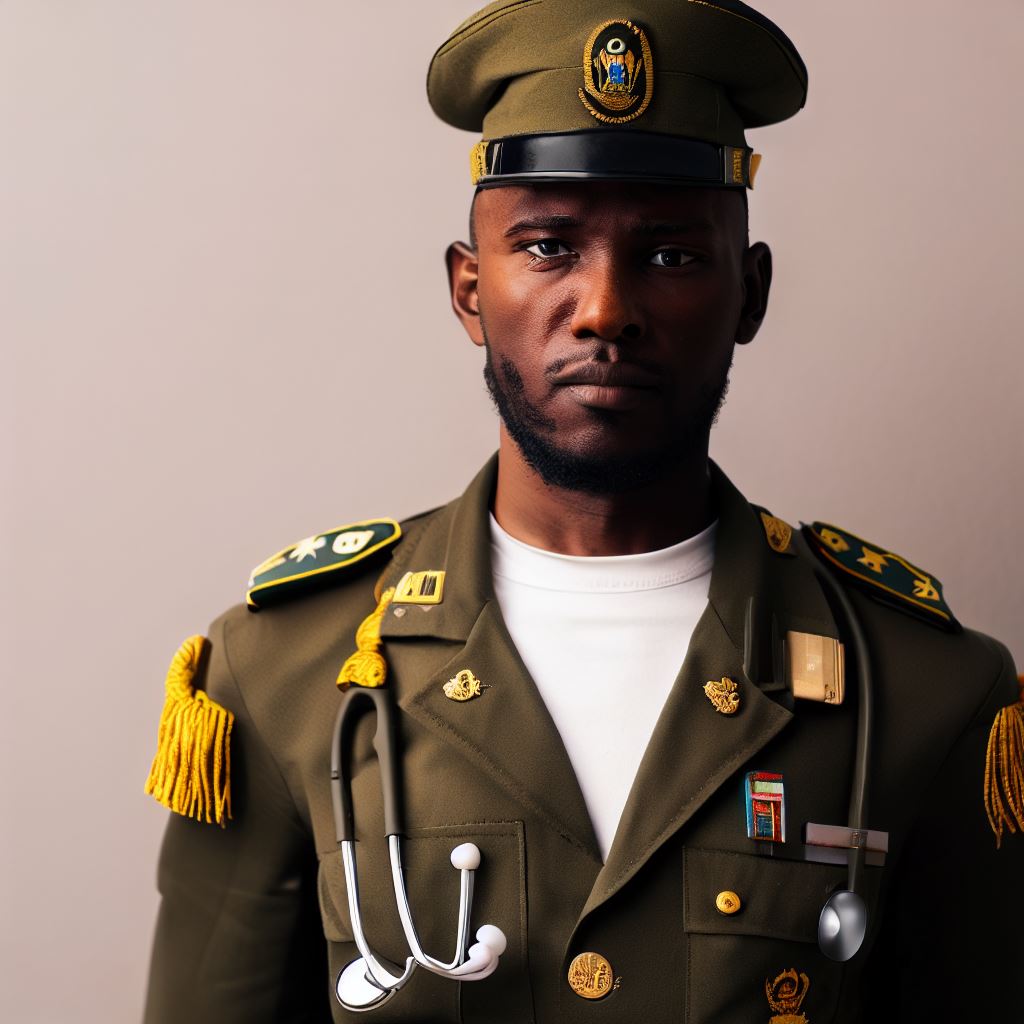Introduction
A. Cadet Life in Nigeria
Explore the fascinating journey of cadet life in Nigeria, a pivotal step in shaping military officers.
B. Understanding Military Officers
Understanding their experiences offers insight into discipline, leadership, and the sacrifices these officers make.
C. Thesis Statement
This post unveils the rigorous training, challenges, and commitment that define a military officer’s cadet life in Nigeria.
Background of Cadet Life in Nigeria
A. The Nigerian military academies
The Nigerian military academies, such as the Nigerian Defense Academy (NDA) and the Nigerian Police Academy (NPA), play a significant role in shaping cadets into competent military officers.
These institutions provide intensive training programs for aspiring officers to develop their skills and character.
B. Overview of the Cadet Training Program
The Cadet Training Program is a rigorous and demanding process that aims to prepare cadets for the challenges and responsibilities of military life.
It encompasses various aspects, including academic education, physical fitness training, leadership development, and character building.
The training program also focuses on leadership development. Cadets are taught essential leadership skills, such as effective communication, decision-making, and problem-solving.
They are given opportunities to lead and are evaluated on their leadership abilities, preparing them to assume command positions in the future.
Cadet life is highly structured, with a strict daily schedule that leaves little room for personal leisure.
This rigorous routine is designed to instill discipline, time management skills, and the ability to thrive under pressure. Cadets must adapt to this demanding lifestyle to succeed in their training.
Throughout their time as cadets, individuals undergo a transformation both physically and mentally. They learn to overcome obstacles, persevere in the face of adversity, and develop resilience.
This transformation shapes them into strong, confident, and capable officers who are prepared to serve and protect their nation.
C. Importance of discipline and physical fitness in cadet life
Discipline is a fundamental pillar of cadet life. Cadets are taught to follow strict rules and regulations, fostering a culture of respect, obedience, and professionalism.
Through the strict enforcement of discipline, cadets are groomed to become disciplined leaders who can make sound decisions under pressure.
Physical fitness is another crucial component of cadet life. Cadets undergo intensive physical training, including rigorous exercise routines, combat drills, and endurance tests.
This training prepares cadets for the physically demanding nature of military operations and helps them develop strength, resilience, and overall fitness.
In addition to discipline and physical fitness, cadets also receive comprehensive academic education.
The curricula include subjects such as military strategy, weapons training, leadership principles, and social sciences.
This knowledge equips cadets with the necessary intellectual skills to analyze and solve complex military problems.
The importance of teamwork and camaraderie is instilled in cadets from the start. They are trained to work together as a cohesive unit, emphasizing the value of unity and cooperation.
This teamwork is further reinforced through activities like field exercises, group projects, and team-building exercises.
In fact, cadet life in Nigeria’s military academies is a transformative experience that molds individuals into disciplined and competent military officers.
The rigorous training program, encompassing discipline, physical fitness, academic education, teamwork, and leadership development, prepares cadets for the challenges of serving in the armed forces.
Through this comprehensive training, cadets are equipped with the necessary skills, knowledge, and character traits to excel in their military careers.
Read: Nigerian Military Officers in Peacekeeping Missions
The Recruitment Process
A. Requirements and qualifications to become a cadet
To become a cadet in Nigeria, there are certain requirements and qualifications that candidates must meet.
These include being a Nigerian citizen, having a minimum height of 1.68 meters for males and 1.63 meters for females, and possessing at least a credit pass in five subjects, including English and Mathematics, in the West African Examination Council (WAEC) or National Examination Council (NECO) exams.
Additionally, candidates must be between the ages of 17 and 22.
B. Overview of the selection process
The selection process to become a cadet in Nigeria is a rigorous and highly competitive one.
It consists of different stages, including a written examination, physical fitness test, medical examination, and an interview.
The written examination assesses candidates’ knowledge in subjects such as English, Mathematics, and General Knowledge, while the physical fitness test evaluates their physical stamina and agility.
The medical examination ensures that cadets are physically and mentally fit to endure the demanding military training.
C. Importance of character assessment in the recruitment phase
Character assessment plays a crucial role in the recruitment phase of cadets in Nigeria. The Nigerian military places great emphasis on integrity, discipline, and loyalty.
Therefore, candidates’ character is thoroughly evaluated to ensure they possess the necessary qualities to serve as military officers.
This assessment is conducted through interviews, background checks, and reference contacts.
Candidates must demonstrate good moral conduct, leadership potential, and the ability to work in a team.
Additionally, they should display a high level of courage, as well as a commitment to upholding the military’s core values.
Recruitment Process
1. Application
Interested candidates submit their applications along with the required documents, such as educational certificates and birth certificates.
2. Written Examination
Eligible candidates are invited to take a written examination that tests their knowledge in various subjects.
3. Physical Fitness Test
Those who pass the written examination proceed to the physical fitness test, which assesses their physical strength, endurance, and agility through activities like running, push-ups, and sit-ups.
4. Medical Examination
Candidates who successfully complete the physical fitness test undergo a thorough medical examination conducted by military doctors.
This examination ensures that candidates are fit for the demanding physical and mental challenges of cadet life.
5. Interview
The interview phase focuses on assessing candidates’ character and potential as military officers.
It involves face-to-face interviews conducted by a panel of experienced military personnel who evaluate the candidates’ responses, leadership qualities, and interpersonal skills.
6. Background Checks
Background checks are conducted to verify the information provided by the candidates and to ensure they have no criminal record or associations that could compromise the security or reputation of the Nigerian military.
7. Reference Contacts
As part of the character assessment process, references provided by the candidates are contacted to gather additional information about their moral conduct, work ethic, and suitability for a military career.
8. Final Selection
After completing all the aforementioned stages, a final selection is made based on the candidates’ performance, qualifications, and character assessment results.
Those who are selected are offered admission into the Nigerian military academy as cadets.
Becoming a cadet in Nigeria is a prestigious and challenging endeavor.
The recruitment process aims to identify individuals who possess the necessary physical and mental attributes, as well as the character traits required to serve as military officers.
By adhering to strict requirements and undergoing a comprehensive selection process, Nigeria ensures that only the best candidates are chosen to protect and defend the nation.
Read: How to Join the Nigerian Army as an Officer
Life During the Training Period
A. Overview of the structure and content of cadet training
Cadet training in Nigeria is a rigorous and comprehensive program that aims to develop disciplined and competent military officers. It consists of theoretical classroom lessons and practical field exercises.
- Classroom lessons cover a range of subjects including military tactics, weapons handling, leadership principles, and national security.
- Cadets are taught how to march, perform physical exercises, and engage in combat simulations.
- They undergo specialized training in their chosen field, such as infantry, artillery, armored corps, or engineering.
- The training program also focuses on character development, instilling in cadets the core values of integrity, loyalty, and selflessness.
B. Daily routine and schedule
Cadets have a highly structured daily routine that starts early in the morning and ends late at night.
- They wake up before dawn for physical training sessions, which include running, push-ups, and other exercises to build strength and endurance.
- After breakfast, they attend classroom lectures, where they learn about military strategies, history, and weapon systems.
- Cadet trainees also participate in practical exercises and field training, where they learn to navigate, set up camp, and execute combat operations.
- In the evenings, they have study periods to review what they’ve learned during the day and prepare for upcoming exams.
C. Challenges faced by cadets: physical, mental, and emotional
Cadet life is not without challenges, and these challenges test the cadets’ physical, mental, and emotional resilience.
- The physical demands of the training program push cadets to their limits, with grueling physical exercises designed to build strength and stamina.
- Mentally, cadets must absorb vast amounts of information and apply critical thinking skills to solve complex military problems.
- Emotionally, cadets may experience homesickness and the stress of being away from family and friends for extended periods.
- The high standards and strict discipline of the training can also be mentally and emotionally challenging, requiring cadets to remain focused and motivated.
Life as a cadet during the training period in Nigeria is an intense and demanding experience that shapes individuals into well-rounded military officers.
Cadets undergo a comprehensive training program that combines theoretical knowledge with practical exercises, and they must adhere to a strict daily routine.
Throughout their training, cadets face physical, mental, and emotional challenges, which test their resilience and determination.
However, these challenges also contribute to their growth and prepare them for the responsibilities of being military officers.
Read: Retirement from the Military in Nigeria: What’s Next?
The Physical Training Regimen
In the military, physical fitness is of utmost importance. It plays a crucial role in the overall effectiveness and efficiency of a military officer.
Therefore, a rigorous physical training regimen is implemented to ensure optimal performance.
A. Importance of Physical Fitness in the Military
- Enhances endurance and stamina in combat situations.
- Improves overall strength and resilience to physical stress.
- Promotes discipline, teamwork, and camaraderie among fellow soldiers.
- Inculcates a sense of personal responsibility and pride in one’s physical abilities.
- Reduces the risk of injuries during physical tasks and missions.
B. Overview of the Exercises and Drills
The physical training regimen includes a variety of exercises and drills designed to target different aspects of physical fitness.
These exercises focus on both cardiovascular endurance and muscular strength.
Cardiovascular Endurance Exercises
- Running or jogging for long distances to build stamina.
- Interval training, such as high-intensity sprinting followed by short recovery periods.
- Swimming to improve lung capacity and overall body endurance.
- Cycling or biking for extended periods to enhance cardiovascular fitness.
Muscular Strength Exercises
- Push-ups, pull-ups, and dips to strengthen upper body muscles.
- Squats, lunges, and deadlifts for lower body strength and stability.
- Planks, sit-ups, and crunches to develop core muscles.
- Weightlifting and resistance training to increase overall muscular strength.
C. Physical and Mental Benefits of the Training
Engaging in a regular physical training regimen offers numerous benefits that extend beyond physical fitness alone.
Physical Benefits
- Improved cardiovascular health and reduced risk of heart diseases.
- Enhanced muscular strength, endurance, and flexibility.
- Better body composition with reduced body fat and increased muscle mass.
- Increased bone density, reducing the risk of osteoporosis.
- Overall improvement in physical appearance and confidence.
Mental Benefits
- Boosts mood and mental well-being through the release of endorphins.
- Relieves stress and helps manage anxiety and depression.
- Enhances cognitive function and improves learning and memory abilities.
- Builds mental resilience and the ability to handle challenging situations.
- Develops self-discipline, focus, and determination.
In essence, the physical training regimen in the Nigerian military is an integral part of a military officer’s life.
It fosters physical fitness, mental toughness, and discipline, ultimately contributing to the officer’s overall effectiveness.
Through a combination of cardiovascular and strength-based exercises, soldiers develop the necessary endurance, strength, and resilience required for combat situations.
Moreover, the training regimen offers a wide range of physical and mental benefits that positively impact the officer’s health and well-being.
It is through this dedication to physical fitness that military officers are able to uphold their duty of protecting and serving their country.
Read: Technology in Nigeria’s Military: Officer Insights

Academic Curriculum
A. Subjects and areas of study during cadet training
Cadets are required to study a wide range of subjects and areas during their training. These subjects include mathematics, physics, chemistry, biology, English, history, and geography.
Cadets learn to analyze complex situations and come up with strategic solutions. The academic curriculum in cadet training fosters discipline and a strong work ethic.
Cadets are taught to prioritize their academic responsibilities and manage their time effectively. They are expected to study diligently and excel academically, while also fulfilling their military duties.
The curriculum instills a sense of responsibility and accountability in cadets.
They understand that their education not only benefits them individually but also contributes to the effectiveness of their unit and the entire military organization.
The academic aspect of cadet life instills a lifelong love for learning and intellectual growth. It shapes cadets into well-rounded individuals who are constantly seeking knowledge and self-improvement.
The academic curriculum also emphasizes the importance of teamwork and collaboration.
B. Integration of military theory and practical skills
In addition to these academic subjects, cadets also receive training in military theory and practical skills. This integration of academic and military training is a key component of the cadet curriculum.
It ensures that cadets develop both intellectually and physically, preparing them for the challenges they will face as military officers.
The combination of academic studies and military training prepares cadets for the complex challenges of leadership.
They graduate with a solid foundation of knowledge and skills, ready to serve as competent and capable military officers.
The academic curriculum in cadet training is dynamic and continuously updated to reflect the evolving nature of warfare and the military.
C. Importance of education in military leadership
The importance of education in military leadership cannot be overstated. A well-rounded education equips cadets with the knowledge and skills needed to make informed decisions.
It also helps them develop critical thinking abilities and problem-solving skills. Cadets frequently engage in group projects and assignments, learning to work effectively with their peers.
They develop essential interpersonal skills and learn to value the input and perspectives of others.
Publish Your Professional Profile, Business or Brand
Showcase your expertise, gain trust, and boost visibility instantly on Professions.ng.
Publish NowCadets are exposed to the latest research and developments in various fields, ensuring that they remain at the forefront of knowledge in their respective areas.
Overall, the academic curriculum in cadet life plays a crucial role in shaping the future leaders of the Nigerian military.
It equips cadets with the education and skills necessary to excel in their roles and contribute to the defense and security of their nation.
Gain More Insights: Nigeria’s Special Police Units: A Comprehensive Overview
Leadership and Discipline
In the Nigerian military, leadership and discipline are of utmost importance. The training and development of officers focus heavily on instilling discipline and obedience.
The methods used during training are designed to cultivate leadership qualities in cadets.
Through rigorous exercises and challenging situations, future officers learn the necessary skills to lead and inspire others.
Mentors and instructors play a critical role in shaping the minds of cadets.
They provide guidance, support, and valuable lessons based on their own experiences in the military.
A. Emphasis on Instilling Discipline and Obedience
- Discipline is the cornerstone of military life, and cadets are taught the importance of following orders without question.
- Strict regulations and routines create an environment where discipline becomes second nature.
- Cadets are expected to maintain a high level of personal and professional conduct at all times.
- Failures to adhere to the code of conduct result in immediate consequences.
A strong emphasis on leadership and discipline ensures that future Nigerian military officers possess the necessary qualities to lead their subordinates effectively and execute missions with precision.
By instilling discipline and obedience, the military cultivates a culture of respect, order, and efficiency.
Cadets learn the importance of following orders and adhering to regulations, realizing that their actions directly impact the success of the mission and the safety of their comrades.
B. Training Methods to Develop Leadership Qualities
- Cadets undergo a series of physical and mental challenges designed to push their limits.
- Teamwork exercises encourage cadets to work together, enhancing their leadership and communication skills.
- Simulated combat scenarios test cadets’ decision-making abilities and their capability to lead under pressure.
- Critical thinking skills are honed through problem-solving exercises, allowing cadets to analyze and strategize effectively.
The training methods employed focus on developing leadership qualities through various physical, mental, and teamwork exercises.
The challenges faced during training mold cadets into confident and capable leaders who can make quick decisions under pressure and inspire their teams to achieve their goals.
C. Role of Mentors and Instructors in Shaping Future Officers
- Mentors and instructors provide invaluable guidance and support to cadets throughout their training.
- They share their wisdom and experiences, instilling the values and virtues necessary for effective leadership.
- Personal mentorship relationships foster trust, respect, and open communication between mentors and cadets.
- Instructors serve as role models, demonstrating the qualities and attributes of successful military officers.
Mentors and instructors play an indispensable role in shaping the character and mindset of future officers.
By sharing their experiences and providing guidance, they prepare cadets for the challenges they will face in their military careers.
Leadership and discipline are the bedrock of the Nigerian military.
By investing in the training and development of officers in these areas, the military ensures that it remains a force admired for its professionalism, effectiveness, and commitment to serving the nation.
You Might Also Like: Nigeria’s Bomb Disposal Heroes: Notable Individuals
Challenges and Rewards
A. Difficulties Faced by Cadets
- Cadets in Nigeria face numerous challenges during their training.
- Physical demands such as rigorous physical fitness exercises push their limits.
- They undergo intense military drills and training to develop discipline and combat skills.
- Mental challenges are also present, as cadets must constantly think on their feet.
- They are taught strategic thinking, problem-solving, and decision-making skills.
- Cadets often experience tough situations during field exercises and mock combat scenarios.
- Pushing through physical and mental fatigue becomes a constant test of their resilience.
- Living in a disciplined environment with strict rules and regulations can be overwhelming.
- Cadets may face homesickness, especially during their initial days in training.
- Being away from family and friends creates a sense of loneliness and longing.
B. Balancing Academics, Training, and Personal Life
- Cadets must excel in academics while meeting the rigorous demands of their military training.
- They need to dedicate ample time to studying various subjects and military tactics.
- Time management becomes crucial for cadets to balance their academic and training commitments.
- Maintaining a healthy personal life is challenging due to the demanding nature of the training.
- Cadets may have limited time for leisure activities, socializing, and pursuing personal interests.
- Effective multitasking skills are essential for successfully juggling these different aspects of cadet life.
- Striking a balance between academics, training, and personal life requires immense dedication and discipline.
- Cadets must prioritize their commitments and make sacrifices to meet their responsibilities.
C. Satisfaction and Pride in Becoming a Military Officer
- Despite the challenges, cadets take immense pride in their journey to becoming military officers.
- They develop a deep sense of camaraderie and bond with their fellow cadets.
- Enduring the hardships together forms strong friendships and fosters teamwork.
- As cadets progress through their training, they witness their personal growth and transformation.
- They gain a profound sense of accomplishment in surpassing their physical and mental limitations.
- Completing the training and receiving the rank of a military officer brings a great sense of satisfaction.
- Their hard work, dedication, and sacrifice pay off as they contribute to the defense of their nation.
- Cadets feel honored to serve their country and protect its interests.
- Becoming a military officer becomes a lifelong source of pride and a cherished achievement.
- The challenges faced during their cadet life become valuable experiences that shape them as leaders.
In a nutshell, the life of a cadet in Nigeria is filled with challenges, requiring physical and mental endurance. Balancing academics, training, and personal life becomes a constant struggle.
However, the rewards are immense as cadets develop resilience, discipline, and pride in becoming military officers.
The sacrifices they make are driven by a sense of duty to serve their country and contribute to its defense.
Becoming a military officer is a transformative journey, shaping cadets into leaders ready to face any challenge.
Conclusion
This blog post explored the cadet life in Nigeria and the journey of a military officer.
We discussed the challenges, sacrifices, and rewards that come with this profession.
Understanding the cadet life in Nigeria is crucial as it provides insights into the rigorous training, discipline, and values instilled in military officers.
Through this post, we realize the dedication and commitment required to serve as a military officer in Nigeria.
Their sacrifices and commitment to protecting the nation deserve our utmost respect and gratitude.
Let us always remember the importance of supporting and appreciating the men and women who selflessly serve in the Nigerian military.




